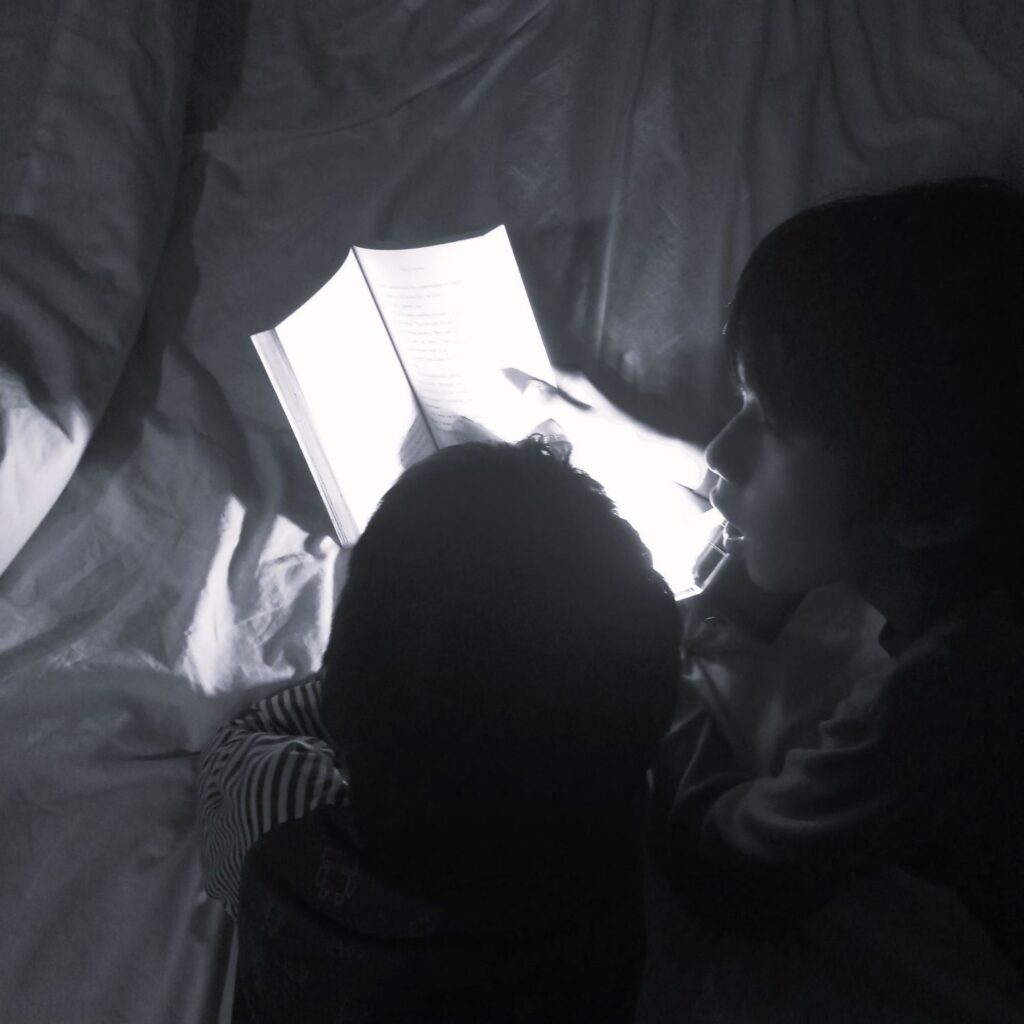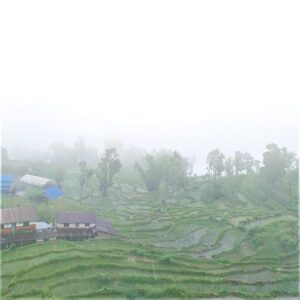Fog blanketed the sky like stained muslin hovering above, gifting nothing to vision. Devoured by darkness, dawn could not penetrate. Yet, darkness offers solace – so infiltrating, tranquillizing and still.
The arrival of cool wind shifted the clouds. It was a relief but it was also a precarious prelude to a thunderstorm. The wind howled, ushering the mighty pavlova ones before the sky released its clench. Towering strips of lightning flashed across the ashen skyline like a blinking stroboscope. The transformer in the vicinity was zapped.
Once. Twice. Thrice.
Showers of spark lit up like angry fireworks before it was rendered malfunctioning. Power lines were severed instantly and our two-week-old stabiliser survived not the fury surges.
The next storm blew the junction box into smithereens.
Monsoon has been disruptive adopting unusual patterns of the global heat wave. Soaring temperatures reached historical peaks in Astam. Work on-site, although coming to a close floundered upon unforeseen cracks exacerbated by destructive forces of nature. The unpredictable brings forth trouble displacing us in unchartered territory, not quite knowing what the solutions are quite yet.
These were silent reconstructive weeks. The face of the sky transformed with changing states of mind, fluctuating between calm and zeal, azure and ash, gay and grave. We grew away from old associations and saw something else in life. There was sometimes squareness that would not fit the round. Acquaintance with the natural phenomena occurs just being here. Living it. Seasons in their moods, winds in their different tempers, water cycles in their swinging rhythms. Papa G is charged with serious inquiries, “Is this all worth it?” The done becomes undone. A step forward sets us backfold. The unbecoming never ceases.
The morning sun was like a great inflamed wound in the sky. The damages were stark. Spirits were low. Only the weed flowers glowed with fallen dew.
We took shelter indoors from the stifling heat. The power company was not answering our calls. It could be another long haul of power deprivation. The longest length of powerless time that we had experienced in Astam was 3 whole days and when all batteries were exhausted, frustration magnified. For the agitated boys, it was interesting to see how it affected them. It was like a piece of life sliced away or a limb dismembered.
The forces of nature constantly remind us how small we are in the larger things of life. It also possesses the superpower of taming internet addiction. And when it does, there is an opportunity to replace it with literary paroxysm. Long periods of overcast shadow spark up magic to haul in the books.
Often found with folded limbs and a book perched on his lap, Big A refuses to leave his bed. This year, Little A picked up the familiar bookish fever and reads comfortably on his own with equal fervour. Baby A (nephew) scuttles in and out with his knock-free and creased-free books wanting to be part of the scene, if only for a handful of minutes. Papa G rekindles his reading of Sanskrit. Mama I is thrilled. There is a kind of beauty in living without power from time to time. When three boys are found sharing a bed reading for pleasure with their pages illuminated by a torch, it is a vision of joy.


The very first book that got me truly excited about language and the power of words was from an antiquated second-hand bookshop in Edinburgh. It was down the bend of Victoria Street from Mylnes Court where I lived. I came upon an aged publication, a maroon and leather-bound brick-of-a-book on a dark shelf that was graspable at arm’s length. It stood out, stout and bold, with a magnetic field reaching out to me. The wide spine held the pre-loved pages well and the text was compressed and compacted like a bloated can of sardines except that there were lines of infinite words printed over a thousand and a half pages with a sprinkle of punctuation. When the archaic bookkeeper said I could depart with it for a dear £5, I knew it was an out-of-the-ordinary day. Those were personal life-altering years in a city that hold dear. The book held a collection of Kafka’s work and letters and it became a part of me that summer looking at the world through the most absurd lenses. Kafka had a bent on carrying confrontation with the bizarre where the outcome is often without a solution and the end, rather pointless. And yet his protagonists persevere with the struggles anyway. The labyrinths they find themselves in are inescapable and impossible and ironically, it serves to self-perpetuate the very struggle they are trying to resolve; that is to say, by trying to resolve the irresolvable.
Kafka planted a seed from within for the need to read more profoundly and deeply. He opened the door for me to literature and the big bounty books. Fast forward 22 years, with hindsight and more life experience, his convoluted narratives somehow seem to make better sense of my world. From him, I discovered other great minds and many more, and the ball has never stopped rolling. It dawned that each new read from a new author, often connected in one way or another from the previous eventually becomes a kind of family tree or an intertwined network that builds upon an understanding of life. When the process of consciously recording an ‘author tree’ manifested, I could trace my growth as a reader and see a kind of mirror image of my life journey. And since books are often chosen from a place of curiosity or a need to address a certain point in life, this became a map for reflection. It showed how we are bridged to the world and how we are connected to our own evolving stories through the voices of others. It is as if I could know people, truly, more intimately, deeply, and profoundly.
Ever since we lost our belongings, we learned that we had little need for replacement except for books. We are gratified that Uncle G, to his best ability, caters to it when he can. We live in a place where reading is not widely supported, books are taxed and there is no means to online purchase. So I learned to curate booklists that are meaningful and source-able. There is truth that scarcity cultivates appreciation and encourages new habits. The act of re-reading, being one, has surprised us with what we can gain from it. In this digital age that increases short attention spans and promotes surface reading, deep reading is more than ever a vital antidote to counterbalance our zeal for quick fixes.
I recently completed Don Quixote and it was a want for a difficult read. Although not a fan of chivalric romances, I dug in regardless, instinctively knowing that there must be something deeper offered by Cervantes. Volume One was entertaining peppered with wit and humour, enveloping around a warm spirit of brotherhood but the adventures of Don Quixote and Sancho Panza gradually wore me off. Admittedly relieved coming to the end of that volume, I took a 2-week break and read a contrasting non-fiction text, needing a neutraliser. On returning to Volume Two, this time the plot twists gripped me and gave me the meaningful gist that I was patiently anticipating. As the saying goes, delaying gratification which a great book always does, gives back manifold times. When we find, truly, what comes near that matters to us, it is the sweetest of all gratification. The beauty unfolded and there I found the reasons why Don Quixote is known as the founding work of European literature.
Cervantes gives a kind of allegory that sets forth the eternal struggle between the ideal and the real. He was a learned man who had led a tumultuous life of wars, battles and imprisonment. And when he started to write, he infused his life experiences and wrote comically about the human condition. When Don Quixote was published, it was well received and that prompted him to write a second volume. Whilst doing so, another author took the liberty to publish his sequel before Cervantes was finished. Although horrified by it, Cervantes masterly handled the situation in a fashion that made it work to his advantage. He overturned the sequence of events by injecting the unauthorised author as a character with his fictional characters and his ‘fake’ sequel into his ‘true’ sequel. In the process, he adorned his narrative with fresh layers of perspective, humour and mockery. The style of ‘metafiction’ as we know it today came to life and his ingenuity resulted in a piece of literature that has stood the test of time for over 400 years. This technique was the overarching point for me in appreciating Don Quixote. One could contend that this which was never seen before then had Cervantes already sprouting the seed of postmodernism literature. He was ‘postmodern’ before there was any ‘modern’ to write about!
The boys are thrilled to be making the journey home today. Little A rises early and informs Mama I that he wishes to buy her a dress when we get to KL. “A pink glorious one!” he exclaims. She hooted with laughter not quite knowing what to make of it.


